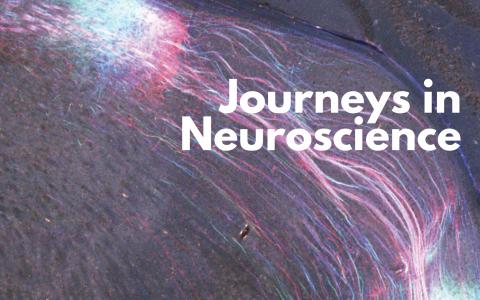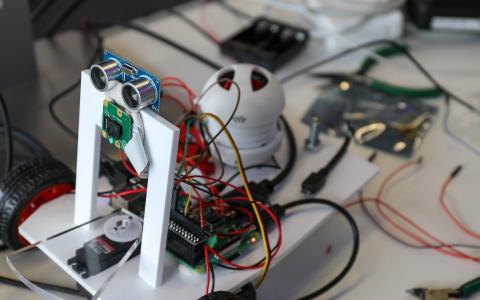
Embarking on a PhD in systems neuroscience
An interview with Shanice Bailey conducted by April Cashin-Garbutt
Shanice Bailey, PhD student in the Isogai Lab at SWC, shares her journey in science so far, her experience in the Black In Neuro community and what inspired her to embark on a PhD in systems neuroscience.
When did you first become curious about science?
As a child, I used to do ballet and many other types of dance including modern, tap, and jazz. Dancing really sparked my curiosity in human biology to understand how the body works and all its capabilities. Also how the body can make very precise movements and achieve replicability.
What sparked your interest in studying the brain and behaviour specifically?
In the final year of my undergraduate degree at the University of Sheffield, I specialised in neuroscience so that initially piqued my interest. But it was really when I started working as a Lab Assistant at the Centre for Neural Circuits and Behaviour (CNCB) in Oxford, that I became fascinated with the brain and behaviour.
Researchers at the CNCB study fruit flies called Drosophila and I was amazed by how many different behaviours fruit flies can exhibit and how we can dissect some of the neural circuits driving those behaviours. After that I knew neuroscience is awesome!
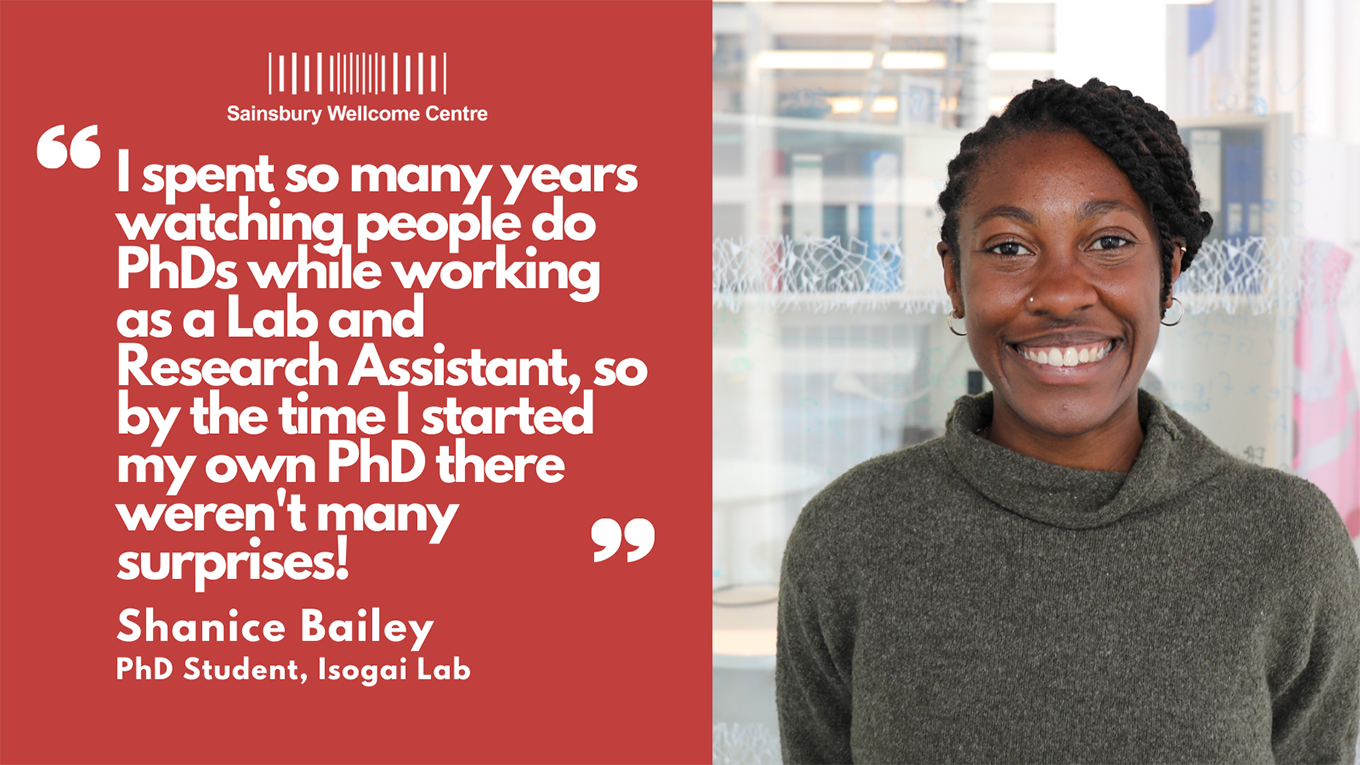
How did you get involved in the Black In Neuro community and please can you tell us more about the initiative?
The Black In Neuro initiative came about following the Central Park birdwatching incident when a White woman walking her dog filed a false police report against a Black birdwatcher. Following this, Black In Birdwatching was born and subsequently a number of other communities including Black In Neuro. Essentially these networks enable Black people to connect in spaces where they are typically underrepresented.
I first heard about Black In Neuro through Twitter and I have two friends that are on the organising committee. It is a great community and I enjoy attending talks (virtually at the moment!) and connecting with people, many of which are in the US. I also recently took part in a podcast as part of Black In Neuro Week 2021 where I shared my experiences in neuroscience.
How important do you feel role models are for inspiring the next generation of neuroscientists?
Super important! It is very hard to imagine yourself in a position that you’ve never seen someone who looks like you or has the same background as you in. For this reason, representation is powerful/crucial and enables people to think ‘if they can do it, so can I!’
This is not just about competency but also about pathways. If you are from a low socio-economic background and you see someone from the same background in a certain position, then you know there must be some sort of structure in place that can enable you to get there. If you don’t see anyone from your background, then you feel that it’s not for people like you.
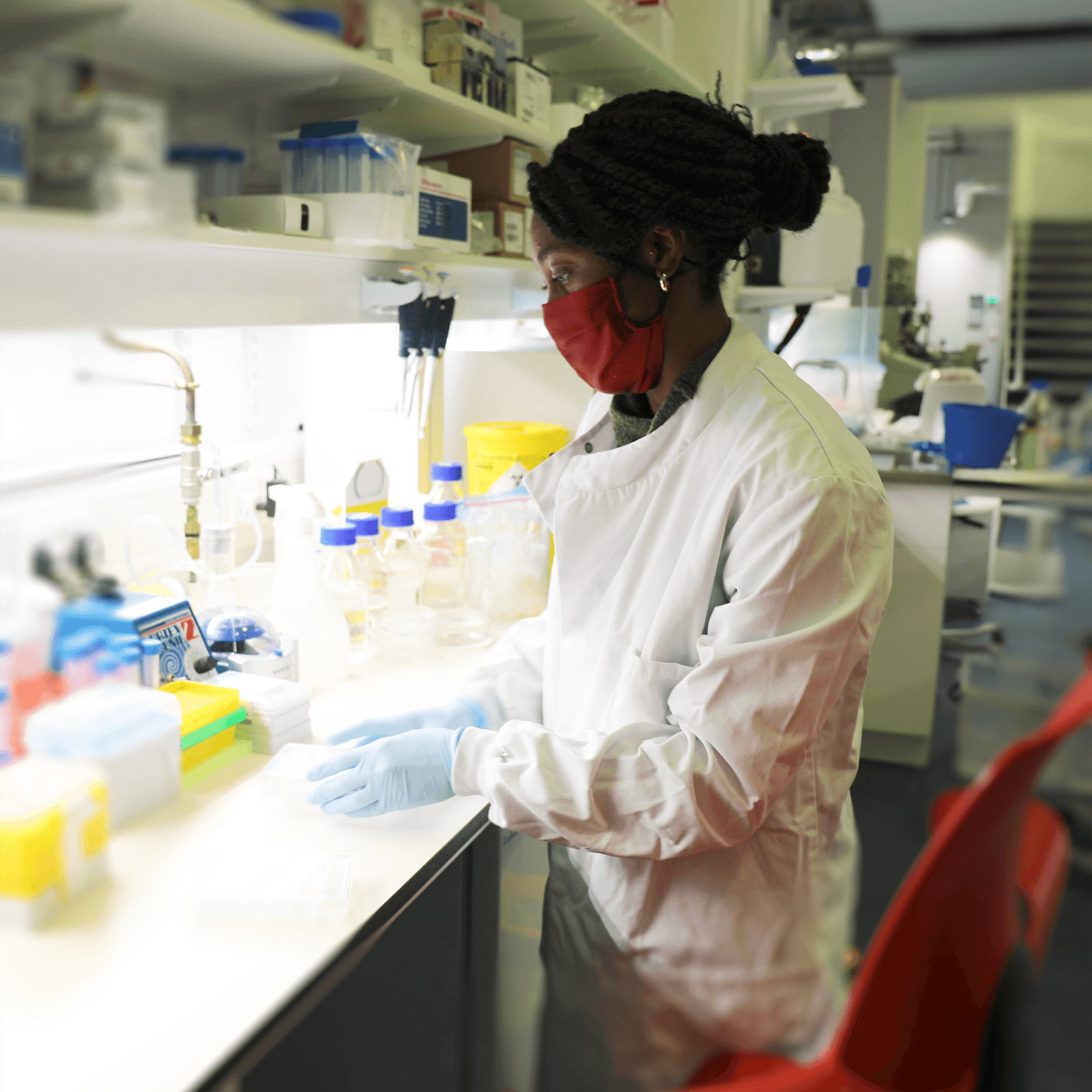
Who were your role models growing up and how did they shape you and your ambitions?
Two of my role models were Usain Bolt and Shelly-Ann Fraser-Pryce, who are both gold medallists for Jamaica. I felt proud to see people achieving great things from the land that my family has come from. Also I was inspired by the amount of dedication and perseverance that goes into achieving a gold medal.
My mum also was, and still is, a big role model for me. She works really hard and she champions education and believes very strongly that it can open doors. My family have always been very supportive of my journey in science.
Were you inspired by any particular scientists?
During my master’s degree at UCL I was working on chemogenetics in the auditory cortex in the context of social behaviour and I came across a paper by Bianca Jones Marlin. I looked her up and found that she’s a Black American neuroscientist – the first that I had ever come across! For me, this was a very inspirational moment.
I am also inspired by several researchers who have mentored me – particularly my master’s supervisor and my supervisory team in Cambridge. Their sharp minds, passion for science and supportive leadership were so motivating.
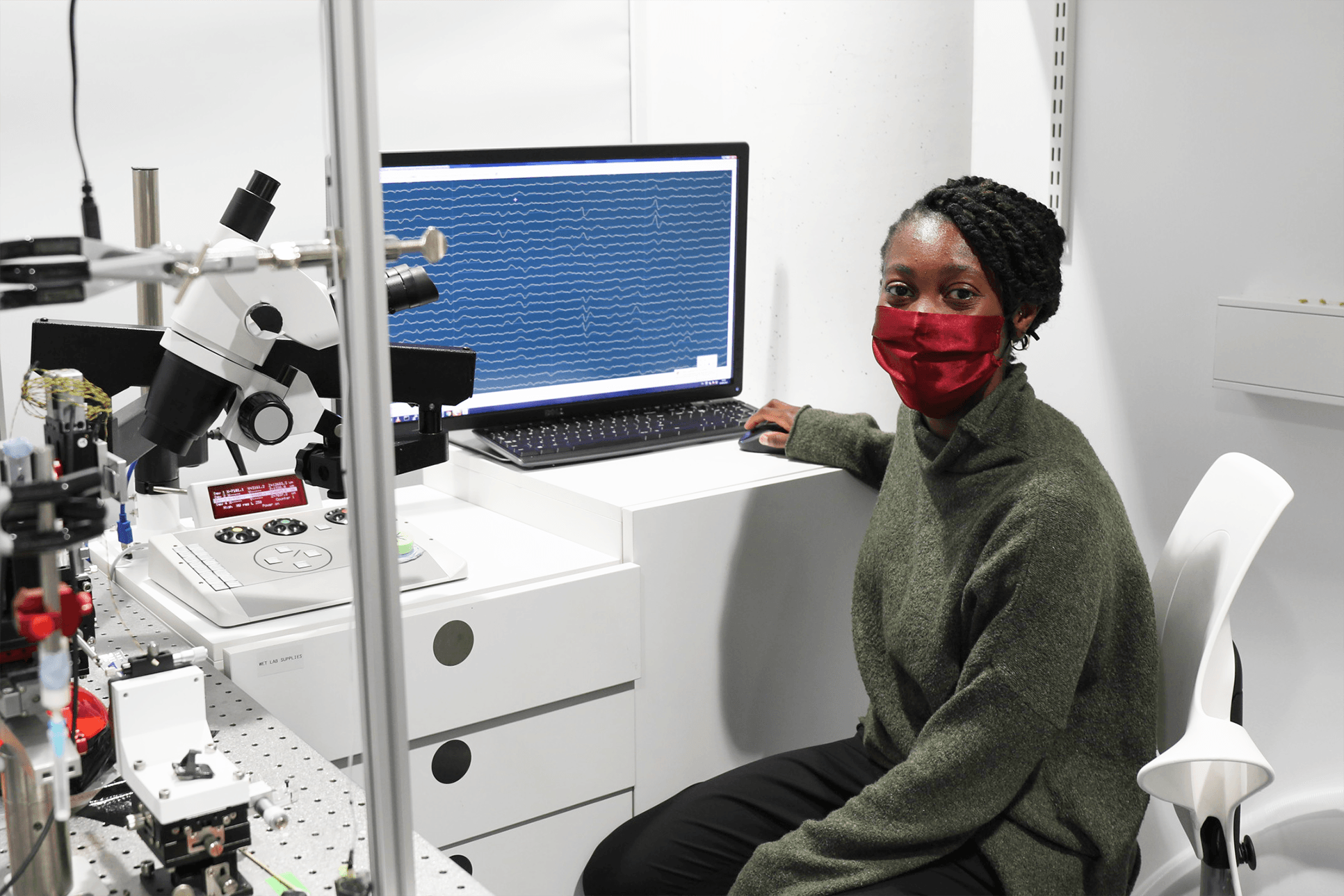
What were some of the main obstacles you had to navigate to get to where you are today?
The main obstacle was a lack of confidence. Many people do an undergraduate and master’s degree and then move straight onto a PhD, but I didn’t feel that was something I could do. It took me a few years to believe I could do it.
Then when I applied the first time, I didn’t get in anywhere with my applications. At that point I felt like either I take this as confirmation that I was right all along and I can’t do this, or I can work really hard to improve my skillset and my knowledge and get there. I’m really pleased I decided to go down the latter avenue! I also made a lot of great friends during my journey!
Why do you feel you had a lack of confidence?
There were a few people along the way who didn’t believe I could and tried to persuade me to choose something else, perhaps because some of my earlier grades were not as strong as other students. I definitely thought you had to be a genius to do a PhD, but learnt that good work ethic, enthusiasm and resilience go a long way.
You are nearing the end of the first year of your PhD at SWC – what has the experience been like so far?
It has been during the pandemic, so quite different! I think that the institute has done an awesome job of welcoming all the new students and making alternative arrangements so that we can learn and progress well despite everything that’s going on.
I have learned an absolute tonne, so that’s been great! I also feel very settled now in my lab. I didn’t do rotations like some people do, instead I joined Yoh Isogai’s lab directly and it has been great to have a base and get to know my team.
I do think now restrictions are easing that the past year was very hard, but I had nothing to compare it to. I feel like I am now coming alive again! I’m having lunch or coffee breaks with friends and different colleagues and it has completely changed my experience.
Why did you go straight into the Isogai lab rather than do rotations? Did you choose SWC based on wanting to work in the Isogai lab?
Exactly! Before joining Yoh’s lab I was working as a Research Assistant at the University of Cambridge where I was studying social behaviour in fruit flies by looking at the neural circuits driving courtship behaviour and female sexual receptivity. In general, I am very interested in why there is a general desire for social interaction across the animal kingdom, and the ways in which animals behave towards each other. Also, the group I was in previously uses pheromonal processing as a circuit entry point, as does Yoh’s lab.
Have you had any opportunities to teach and mentor students during your first year as a PhD student?
I participated in BrainCamp, which was held online over Easter this year. This annual course was founded by SWC PhD student Egzona Morina with the goal of inspiring young people to explore the field of neuroscience. I worked with around 12 students aged between 14 and 18 years old from Albania and it was really fun experience teaching them about the brain.
This year I was also meant to go to my old high school in West London to teach an experimental programme on olfaction and help students conduct their own research projects. This is part of a scheme called Elite Scientists where mentors go into different schools and teach students a science of their specialty. Unfortunately, due to the lockdown this wasn’t able to go ahead but I am hoping to pick this up again next year. I did however give a talk on the day in the life of a scientist, which the school’s career department shared with the students.
Was there anything that particularly surprised you about doing a PhD?
I spent so many years watching people do PhDs while working as a Lab and Research Assistant, so by the time I started my own PhD there weren’t many surprises!
One thing that did surprise me about my PhD at SWC though was just how interdisciplinary it is! I didn’t realise this would stretch to things like electronics and 3D printing. In our optics course, we built a two-photon microscope and for our PhD bootcamp we even built a robot! I never thought I would get to do these things in a biological PhD.
What advice would you give to someone considering a PhD in neuroscience?
My main advice is to talk to people from PhD students, to postdocs to Principal Investigators (PIs). Neuroscience is a huge umbrella term and there are so many different areas within it from systems, to molecular, to behavioural. I would recommend figuring out what really fascinates and inspires you. You should also find out what the day-to-day actually involves and what makes people enjoy what they’re doing. A PhD isn’t a job, it is a degree that you do for yourself, so you need to enjoy it!
What parts of your day-to-day work make you smile?
So many things! Finally seeing an experimental result and potentially finding something that no one’s ever seen before is really exciting!
I also enjoy trying to integrate my data with what’s in the literature and coming up with new hypotheses and concepts. The people I’m surrounded by are very important too!
What are your personal career goals?
I would love to continue to do research. The traditional academic pathway is to do a postdoc and eventually become a PI, but that isn’t the only pathway.
What changes would you like to see in academia moving forward?
I think there needs to be more support available for those with caring responsibilities, both those with children and also those caring for adults. Working in academia can be quite unpredictable and the extra support would help to make things more manageable. I was really pleased to see that SWC has introduced a new Childcare and Carer’s Support Fund. Also it is great to see some conferences are now including a children’s area, which can really help to make academia more compatible for those who have families.
About Shanice Bailey
Shanice transitioned from her undergraduate background in biomedical science to systems neuroscience through technician positions. Her master’s degree in Neuroscience at University College London, further honed her interests to the neural circuit basis of innate social behaviours. During this programme, supervised by Dr Catherine Perrodin, she sought to probe the role of the auditory cortex for the perception of male courtship vocalisations in female mice using chemogenetics.
After graduating, Shanice went on to work as research assistant with Drosophila Connectomics at the University of Cambridge, where she reconstructed neuronal wiring diagrams guiding sexual behaviour in the female fruit fly using electron microscopy datasets and computational tools.
Shanice joined the SWC PhD programme in 2020, and will continue to pursue her interest in the neural underpinnings of instinctive social behaviours as part of the Isogai lab. Additionally, she is passionate about outreach, particularly making science accessible to those from underrepresented backgrounds.
